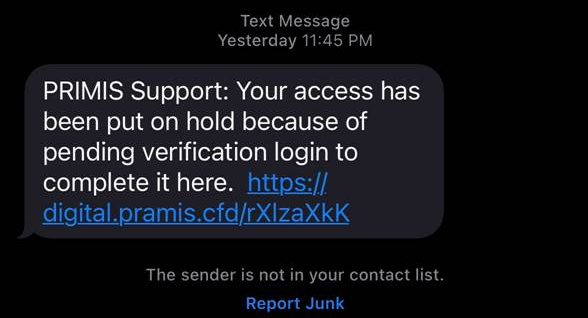cybersecurity
Text Scams 101
Tips on how to spot them and what to do if you’re sent a suspicious message.

Text message scams have become a popular tactic for scammers in recent years, with the goal of trying to trick people into giving up their personal information or money. These scams can be particularly dangerous as many people are more likely to trust messages they receive on their phone.
Here are some tips on how to recognize text scams and how to stay safe:
Be wary of unsolicited messages.
Most of the time, text scams appear out of the blue with no prior context. If you receive a text from an unknown number or someone you don’t know, be extra cautious. Scammers often send out mass messages hoping to lure in unsuspecting victims whose guards may be down.
Watch out for urgent or threatening words.
A lot of scammers like to use fear to try to lure people into their traps. You’ll often see messages with urgent language like “act now” or “immediately,” to create a sense of panic. Any text that demands an immediate response is more than likely a scam. If your bank is like Primis, then the primary contact method for emergencies is definitely not a text message.
Don’t click on links.
Let us repeat that: do not click on any links in texts from unfamiliar senders. This practice should also be applied to emails. If you look closely, a lot of the links contain spelling errors or are from unknown and unsecure domain extensions (not .com, .org, .gov, etc.). Take a look at a recent text scam attempt that we were made aware of:

As you can see, the link contains a spelling error, “pramis,” and a suspicious domain extension. Often times, these scammers are so lazy that the links they send will be completely random jumbles of letters, characters, and numbers. It’s easy to spot, but even easier to ignore any link from an unknown number all together.
Don’t give out personal information.
Primis, and any other financial institution, will NEVER ask you for personal information like your credit card details or social security number over a text. Never, under any circumstances, share any information over a text message that you wouldn’t share with a stranger.
Report suspicious messages to your bank.
Every bank out there has a team that is dedicated to stopping fraud. If you receive a text that you think is a scam, report it immediately. Even if you have the slightest concern, report it. This not only helps you but also will help others from falling victim to the same or similar scam attempts.
The opinions voiced in this material are for general information only and are not intended to provide specific advice or recommendations for any individual. All loans are subject to loan guidelines and approval.